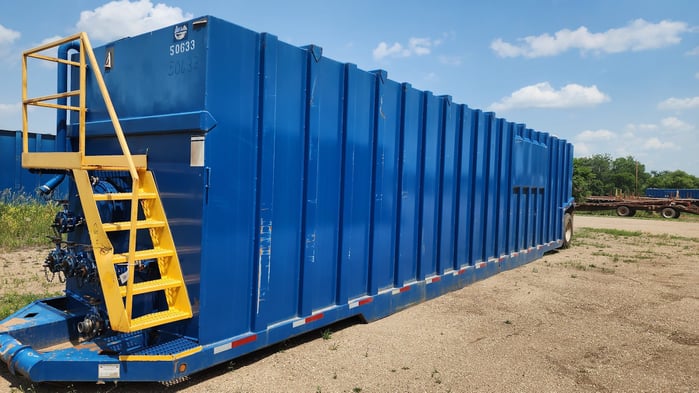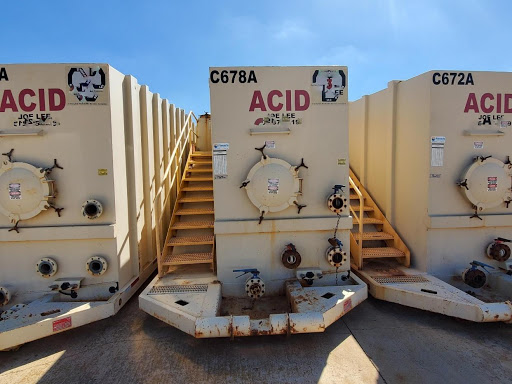
Did you know a 21,000-gallon frac tank can hold a wide range of liquids, from diesel to liquid fertilizer, and septic wastewater? When diesel prices are low, buy a semi-tanker load and store it in a frac tank. Just $.40 a gallon saves you $8,400! The same goes for liquid fertilizer. Instead of buying small batches, buy in bulk and store it in a frac tank until it's ready to be used.
Many people believe frac tanks are only used in the fracking industry, but they can be used to store a wide range of liquids. Before I go on, let me explain what a frac tank is. A frac tank is a large piece of mobile equipment used to store bulk liquids. Frac tanks are made out of steel. The most popular size is the 500 BBL/ 21,000 gallons tank, but a few other options are available. Frac tanks can benefit many industries like agriculture, construction, septic, and oil & gas. Below we will be listing the top 8 liquids people can store in a frac tank.
8 Liquids a Frac Tank Can Store
Septic Wastewater
If you run or work at a septic company, frac tanks provide convenient, portable wastewater storage next to septic pumping operations. Pump directly from a vacuum tank into a frac tank and quickly move to the next operation. The Flat Top Frac Tank is the best tank for this job. The flat-top tank holds 21,000 gallons, so you can transfer 4 to 7 vacuum tank loads depending on the size, into the frac tank for later disposal. Place the frac tank at a central location to make any septic pumping operation more efficient.
For example, if you're pumping at a location that is a far distance from where you need to dispose of the waste, place your frac tank at a centralized location. Now your vacuum tankers only have to travel half the distance to unload, so you can get more pumping done in less time.
Calcium Chloride
Calcium chloride is a crucial chemical compound widely used in various industrial applications, including de-icing, dust control, and as a desiccant. Proper storage of calcium chloride is essential to maintain its quality and safety. Frac tanks can provide a versatile and efficient solution for this purpose.
Frac tanks provide customizable storage capacity, allowing businesses to adjust their inventory to match fluctuating demand. These tanks come equipped with advanced safety features, reducing the risk of spills or leaks, ensuring a safe working environment, and minimizing environmental impact. Moreover, frac tanks help minimize waste and prevent overstocking, leading to cost savings while ensuring that the stored calcium chloride remains effective and within its shelf life.
Dewatering
Groundwater on your job site can be a pain when you are in a time crunch. With a frac tank, you can temporarily store water collected during dewatering on your site to maintain a safe and efficient work environment.
The best tank to use for dewatering is the flat-top tank. Hook up pumps and hoses and pump the unwanted water directly into the tank and store it for later use or disposal. This is extremely helpful in situations where there is not a safe or easily accessible place to pump the water. The best tank to use for dewatering is the flat-top tank.
Environmental Clean-Ups
The best tank to use for an environmental clean-up is a double wall frac tank These tanks have a secondary wall that acts as backup containment in case the tank leaks. Double wall tanks have an outer dimension of 9 feet 6 inches high, 8 feet 6 inches wide, and 46 feet long with an internal capacity of 16,000 gallons.
Double-wall tanks are ideal for projects operating near freshwater areas that need to store dangerous chemicals or contaminated materials. Don’t let your job site become dangerous or fail to meet EPA requirements; contain dangerous materials with a double wall tank.
Don’t have access to a double wall tank? No worries! You can still use a single-wall frac tank as an alternative. Simply place your single-wall frac tank on top of a spill containment berm. Spill containment berms are designed to prevent spills and contain any potential leaks that may occur around your frac tank.
Diesel/Fuel
Frac tanks are a great way to store and stock up on your diesel/fuel. When fuel prices are at their lowest, buy a semi-tanker load and store it in a 21,000-gallon frac tank. Not only will it help you save .20-.40 cents a gallon, ($4,200-$8,400), but you’ll know you will have the fuel when you need it.
The Flat-top tanks are the best to store diesel/fuel. Hook pumps to the tank and make it your own gas station. Place your tank in a strategic location on site for quick and convenient re-fueling of all your equipment without having to leave your job site.
Liquid Fertilizer
Stock up on your liquid fertilizer before planting season, and store it in a frac tank till it’s ready to be used. We recommend using a flat-top tank with no exposed metal and a good lining to store your liquid fertilizer. Place a frac tank in a central location between fields for easy access when it comes time to pump your liquid fertilizer directly into the spreader. By doing this, it saves you time and eliminates a lot of back and forth during spreading operations.
Manure
Store your manure in a 21,000-gallon flat-top frac tank until it’s ready to be used. Many farmers use the dragline system to spread manure instead of using a heavy manure tanker. To do this, attach a hose to the frac tank to easily pump out the manure and distribute it throughout the fields. Doing this will allow you to save valuable time and resources without having to run back and forth to refill your manure tanker.
Chemicals

When working with chemicals, you want to safely store them in a secure storage tank without the worry of the material wearing down the tank. The best tank to store chemicals is our Acid Frac Tank. They are designed to store material with high acidity specifically. Acid tanks can handle Hydrochloric acid that you need onsite to inject into the borehole in your fracking operation. Most acid tanks can handle over 15%ph and some can handle over 32%ph. Acid tanks are also great for storing the hydraulic fluid after it has been recaptured from the well as well as sulfuric acid.
Freshwater
Whether you need fresh water for your drilling site, construction site, or water for your crops the flat-top tank offers the best storage solution. Farmers can also use a flat-top frac tank to store potable water for their livestock. When choosing a tank, make sure you know what has been previously stored in the tank. Usually used tanks have had oil, wastewater, or chemicals in them. This is especially important to understand if you are storing potable water.
Liquid Storage For Any Industry
Frac tanks can be beneficial to many industries around the country. From storing septic wastewater to storing liquid fertilizer on your farm. Frac tanks can be used to store a wide variety of liquids. We have tanks all over the nation. All of our tanks hold 21,000 gallons of liquid and can be hooked up to pumps, filters, vacuum boxes, and other equipment on-site for convenient filling or draining. When it comes to safe liquid storage, trust the experts at Geneva Equipment to get the right used frac tank delivered to your door. Contact us for a quote below.


